The Overture Maps Foundation was established late last year with the stated aim of making actionable map data open-source. Major players like Linux, Amazon, Meta, Microsoft and TomTom contribute to the project. Today, the group unveiled two documents explaining how this data will be structured. This should form the basis for a future where technology can count on a “digital twin” of Earth.
Specifically, Overture Maps is now releasing a document on its Data Schema. In addition, it provides details on what the Global Entity Reference System (GERS) should look like. Together, these details should provide standardization of data entry.
The importance of digital maps is pretty self-evident given the widespread adoption in modern travel, weather forecasts, urban planning and many more areas of society. Google Maps dominates in this regard, with an API for developers that is second to none in its popularity and usefulness. However, you may question its applicability if you’re a developer, as Google stipulates that API users should not build products that compete with Google’s offerings. Ars Technica makes the point that the tech giant could develop a new application that competes with a third-party product that uses the API. Even more insidious is the implication that any successful app can be the inspiration for something Google itself comes up with.
In short, more than enough reason to come up with an alternative. Only then can commercial parties confidently innovate based on map data. The basis for this already existed with OpenStreetMap, which has been operating in an open-source format since 2004. However, it seems that the Big Tech parties behind Overture Maps want to see the arrangement of data differently and be in control themselves, hence the initiative. “Sometimes open map data lacks the structure needed to build commercial apps and services,” the Linux Foundation previously said.
More than a map
Furthermore, the latest press release talks about Overture Maps’ ambitions. “Open map data will become an economic game-changer.” Not just any map data set, in other words. In addition, they state that a single entity can’t recreate the entire world in a virtual space without outside assistance. What is the purpose of this beyond simply being a digital atlas? What image should we have of the “commercial apps and services” one speaks of?
We can find that under the term Web 3.0. This term has been frequently mentioned alongside many a digital project that has not (yet) yielded all too impressive results, or it may be almost impossible to define. Think of such concepts as the metaverse, NFTs and the blockchain. Fortunately, with the recently announced Apple Vision Pro, we see what is possible with “spatial computing,” which may eventually shake up our handling of computing technology. 3D data will become highly relevant here and guide the way forward. For now, it is guesswork which applications in this arena will be successful. However, concrete possibilities include, for example, optimizing the processes surrounding a medical incident. Scientific American presents this as follows: while a team of medical professionals is on its way to a patient, a city system provides perfectly timed traffic lights. Then the doors to the apartment open automatically, while an operating room is already set up as required. All this needs more than map data, of course, but it forms a crucial component.
More commercial applications of open mapping will eventually be on display. What can be expected, however, is that Google’s dominant position will not go unchallenged.
Also read: AWS, Meta, Microsoft and TomTom want to democratize map data
